
Negotiations were held in Sarajevo, June 27, to make preparations for the international conference titled The Significance and Legacy of the Great War to be held next year commemorating the centennial anniversary of the outbreak of World War I. The Great War and its legacy continue to be subjects of challenging academic debate. To mark its centenary the University of Buckingham, together with its Bosnian partner, the Sarajevo School of Science & Technology have planned an international conference, to take place in Sarajevo 26–28 June 2014, at which scholars from a variety of disciplines will be brought together to consider these themes.
A workshop titled "Physical Violence and State Legitimacy in Late Socialism" was organised by the Institute of History, Research Centre for the Humanities, Hungarian Academy of Sciences, Budapest and the Centre for Contemporary History (Zentrum für Zeithistorische Forschung), Potsdam, in Budapest, in the Institute of History in June 20–22, 2013. The website of the international research project – in which some researchers (Apor Péter, Stefano Bottoni) of our Institute also take part – can be found here. The program of the conference can be seen here.
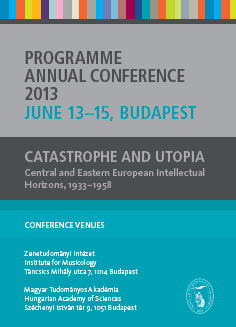 The Imre Kertész Kolleg, Jena in cooperation with the Institute of History of the Research Centre for the Humanities of the Hungarian Academy of Sciences, organized the conference Catastrophe and Utopia: Central and Eastern European Intellectual Horizons, 1933 to 1958 in the main building of the Hungarian Academy of Sciences in Budapest, on June 13–15, 2013. The opening session was held at the Institute of Musicology (Zenetudományi Intézet), where the new English-language journal of the Institute of History, The Hungarian Historical Review was also introduced. The program of the conference can be seen here.
The Imre Kertész Kolleg, Jena in cooperation with the Institute of History of the Research Centre for the Humanities of the Hungarian Academy of Sciences, organized the conference Catastrophe and Utopia: Central and Eastern European Intellectual Horizons, 1933 to 1958 in the main building of the Hungarian Academy of Sciences in Budapest, on June 13–15, 2013. The opening session was held at the Institute of Musicology (Zenetudományi Intézet), where the new English-language journal of the Institute of History, The Hungarian Historical Review was also introduced. The program of the conference can be seen here.
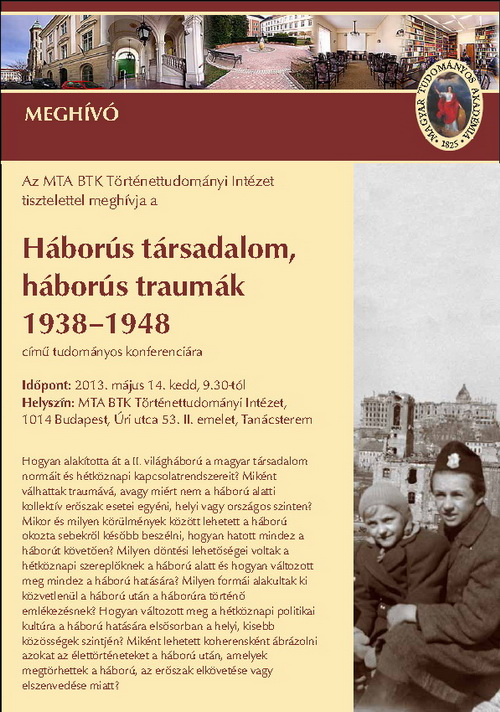 The Institute of History of the Research Centre for the Humanities of the Hungarian Academy of Sciences organised a conference on wartime society and war trauma in Hungary, 1938–48, on May 14, 2013. The lectures covered a broad selection of topics: the effects of the war on the different groups of society, special cases and microhistory of a certain (geographical or social) community during and after the war, political cases (assassinations, court martial proceedings after the war), the memories of Hungarian prisoners-of-war in the Soviet Union, the cult of Miklós Horthy, and the war trauma reflected in literature. The lecturers represented the important research institutes of contemporary history research: Institute of History, Institute of Literature and Institute of Ethnology of RCH HAS, universities (Budapest: ELTE and PPKE Catholic University, Miskolc, Szeged, and Cornell University), Institute of Political History, Historical Archives of the Hungarian State Security, Budapest City Archives. The lectures are planned to be published.
The Institute of History of the Research Centre for the Humanities of the Hungarian Academy of Sciences organised a conference on wartime society and war trauma in Hungary, 1938–48, on May 14, 2013. The lectures covered a broad selection of topics: the effects of the war on the different groups of society, special cases and microhistory of a certain (geographical or social) community during and after the war, political cases (assassinations, court martial proceedings after the war), the memories of Hungarian prisoners-of-war in the Soviet Union, the cult of Miklós Horthy, and the war trauma reflected in literature. The lecturers represented the important research institutes of contemporary history research: Institute of History, Institute of Literature and Institute of Ethnology of RCH HAS, universities (Budapest: ELTE and PPKE Catholic University, Miskolc, Szeged, and Cornell University), Institute of Political History, Historical Archives of the Hungarian State Security, Budapest City Archives. The lectures are planned to be published.
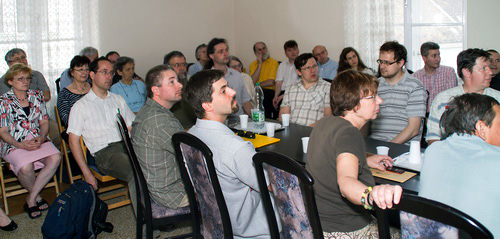 The Early Modern Research Team of the Institute of History and the Institute of Archaeology of the Research Centre for the Humanities of the Hungarian Academy of Sciences organised a workshop with the title Hereditas Siculorum. New research results on old Székely Land on 30th April, 2013, in the Institute of History.
The Early Modern Research Team of the Institute of History and the Institute of Archaeology of the Research Centre for the Humanities of the Hungarian Academy of Sciences organised a workshop with the title Hereditas Siculorum. New research results on old Székely Land on 30th April, 2013, in the Institute of History.
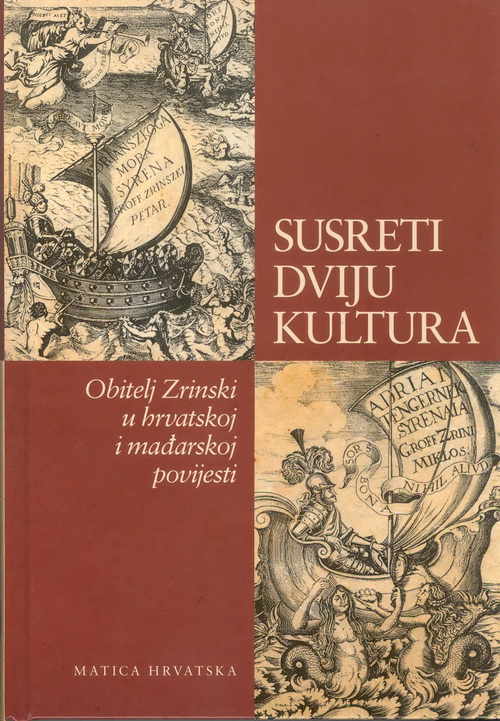
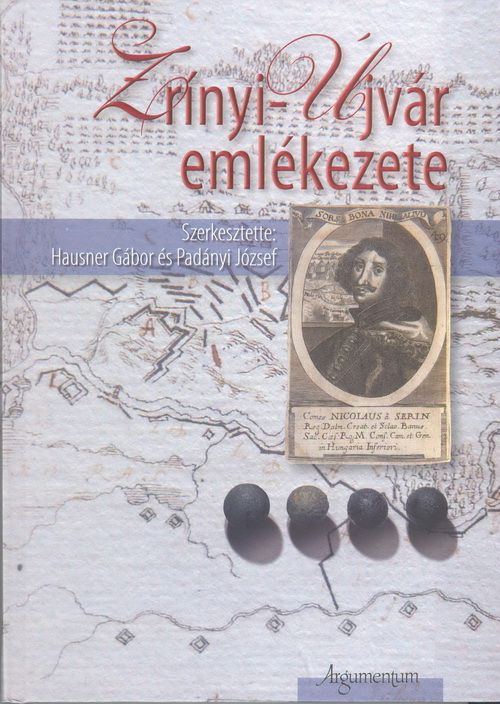 The premiere of two books was organized by the Institute of History of the Research Centre for the Humanities of the Hungarian Academy of Sciences in cooperation with the Military History Institute and Museum on February 12, 2013. Both books deal with the Zrínyi family and were published in interdisciplinary, inter-institute and international cooperation.
The premiere of two books was organized by the Institute of History of the Research Centre for the Humanities of the Hungarian Academy of Sciences in cooperation with the Military History Institute and Museum on February 12, 2013. Both books deal with the Zrínyi family and were published in interdisciplinary, inter-institute and international cooperation.
The Zrínyi family (in Croatian: Zrinski) was a Croatian-Hungarian noble family, influential during the period in history marked by the Ottoman wars in Europe in the Kingdom of Croatia and Hungary. They were playing important role in the wars against the Ottomans, thus they are considered national heroes of two nations, Hungary and Croatia.
On the 28th of November 2012 the RCH, HAS organized a meeting comprising two major events:
1. Presentation of the research agenda and launching of the research project entitled, Reformation and the Hungarian Culture of Migration: Five Centuries of Survival of Reformed Hungarians all over the World.
2. A workshop reflecting on the disparate methodologies and interpretations of European Reformation, entitled: Interpreting Reformation(s): the Use of Competing Theories and Comparative Approaches.
Page 8 of 12